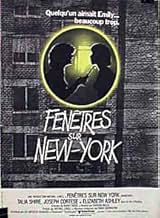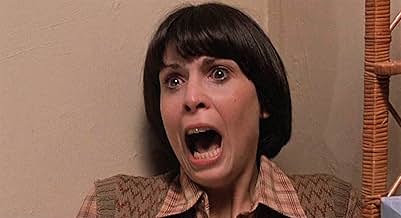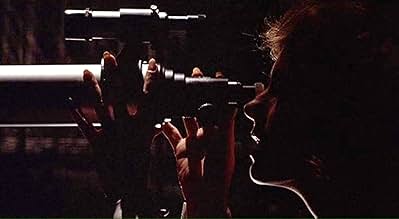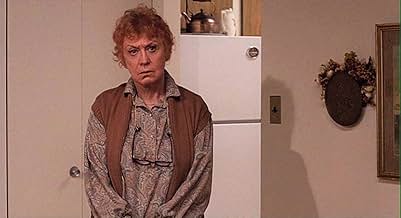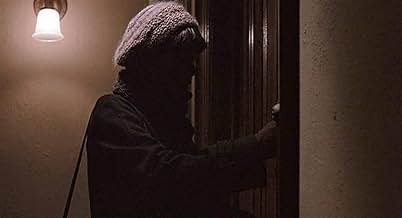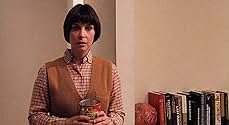VALUTAZIONE IMDb
4,8/10
1049
LA TUA VALUTAZIONE
Aggiungi una trama nella tua linguaA weird woman admires and spies on her shy mousy neighbor with a telescope.A weird woman admires and spies on her shy mousy neighbor with a telescope.A weird woman admires and spies on her shy mousy neighbor with a telescope.
- Regia
- Sceneggiatura
- Star
- Premi
- 6 candidature totali
Joe Cortese
- Bob Luffrono
- (as Joseph Cortese)
Bette Davis
- Charlotte Vale
- (filmato d'archivio)
Recensioni in evidenza
This is one of those flicks I've wanted to see since it came out (I was underage at the time). The plot just sounded very freaky and bizarre. Regardless, it is one of the THE most impossible films to find since I don't believe it got a video release (except overseas) and I don't even think it played on cable in the '80s. It is however on YouTube now :-).
This film gets trashed by a lot of people immediately as being non-PC and homophobic. I think that's more a signpost of when the film was released, when attitudes toward people with other orientations weren't so enlightened.
No, the core problem behind this picture is that it's just a raving, stinking mess, and it really is virtually all Willis' fault. When you read the opening credits, your jaw drops...they read like an A-list of movie greats: Morricone, Bourne, Willis as DP. How could they screw this up? Easy. A) Don't build any suspense; B) Don't establish any characters or motivations; C) Allow the writer to write any damn thing he wants to, no matter how stupid or no matter what expense to the actors; D) Resort to constant dissolves when you don't know what else to do, especially since there is virtually no coherent action; E) Don't direct your actors...after all they're pros, they know exactly what to do. The list goes on....
This is a stalker movie....it should be about stalking. There is absolutely no fear built, no tension. It's a real master class in wasted celluloid.
Still, part of me has to admire this in a way you sometimes admire any bad movie. It sure didn't have any self-censoring going on. it did what it wanted to do and took no prisoners. One of the many things that makes it a museum piece today, even if that museum is a wax one.
This film gets trashed by a lot of people immediately as being non-PC and homophobic. I think that's more a signpost of when the film was released, when attitudes toward people with other orientations weren't so enlightened.
No, the core problem behind this picture is that it's just a raving, stinking mess, and it really is virtually all Willis' fault. When you read the opening credits, your jaw drops...they read like an A-list of movie greats: Morricone, Bourne, Willis as DP. How could they screw this up? Easy. A) Don't build any suspense; B) Don't establish any characters or motivations; C) Allow the writer to write any damn thing he wants to, no matter how stupid or no matter what expense to the actors; D) Resort to constant dissolves when you don't know what else to do, especially since there is virtually no coherent action; E) Don't direct your actors...after all they're pros, they know exactly what to do. The list goes on....
This is a stalker movie....it should be about stalking. There is absolutely no fear built, no tension. It's a real master class in wasted celluloid.
Still, part of me has to admire this in a way you sometimes admire any bad movie. It sure didn't have any self-censoring going on. it did what it wanted to do and took no prisoners. One of the many things that makes it a museum piece today, even if that museum is a wax one.
There are two reasons to watch this movie: Gordon Willis's cinematography & Elizabeth Ashley. It's not as lame as it is made out to be and has exquisite production values, but that being said, it is very niche, succeeding neither as a slasher nor a thriller, but occupying some odd space in between.
"Windows" also reminds us that you can be a great cinematographer but that doesn't necessarily translate to directing: in fact, Gordon Willis never directed another movie again. As far as Elizabeth Ashley, for those not acquainted she was sort of a Tallulah Bankhead of the 70s and 80s. She had a storied Broadway career and multiple husbands and was on The Tonight Show more than 20 times simply because Carson found her amusing. She is captivating, even in claptrap melodrama like this.
This movie was lambasted by the critics when it first came out, snuffing out Talia Shire's major studio leading lady career in the process. Shire had been a hot property after "The Godfather" and "Rocky" movies...but she made three high profile bombs in a row: "Old Boyfriends", "Prophecy", and, finally, "Windows." Film careers ending after a bomb or two happened to a lot of actresses back then and Shire was probably given more chances than most but the bottom line was she just couldn't carry a film.
The movie looks terrific. Ashley wears a series of shimmery Bloomingdales middle-aged Disco blouses and it is impossible not to look at her. She's very interesting as an actress. The city is shot like a lullaby...to Brooklyn (The Brooklyn Heights Promenade and Cher's Cranberry Street block in Moonstruck figure prominently, as does The River Café as well as Fulton Street near Brooklyn Bridge Park, or as it referred to in Windows: "River Street") and Pearl Street in Lower Manhattan. The use of locations is a wonder and everything is very desolate. It definitely creates a mood of unease.
Now, the problems. I don't have an issue with Shire's character, exactly. She is beyond mousey and nearly sexless, with her Prince Valiant hair and series of brown patterned sweater vests and plaid shirts worthy of an assistant librarian. She is certainly not someone one would expect Ashley to be obsessed with. Perhaps that is the point? But we'll never know because the entire story is underdeveloped. It seems to want to coast by on suspense but that is a flaw because there is hardly any suspense whatsoever. The film may have somewhat succeeded had it put some effort into characterizations. Instead we get some hints at what could have been and a choppy series of dull vignettes culminating in an anticlimactic showdown between Ashley and Shire. I do like that they don't spell everything out for you and, if you pause to think, the chain of events is coherent. But it's just not enough.
"Windows" could have been interesting. I think they were going for something akin to "let's make a women's picture about sexual obsession" but then lost their way. Ultimately, it is almost completely devoid of energy but a pleasure to look at and Ashley is always a treat to observe...even when she is wearing eyeglasses the size of dessert plates and stroking an enormous phallic telescope.
"Windows" also reminds us that you can be a great cinematographer but that doesn't necessarily translate to directing: in fact, Gordon Willis never directed another movie again. As far as Elizabeth Ashley, for those not acquainted she was sort of a Tallulah Bankhead of the 70s and 80s. She had a storied Broadway career and multiple husbands and was on The Tonight Show more than 20 times simply because Carson found her amusing. She is captivating, even in claptrap melodrama like this.
This movie was lambasted by the critics when it first came out, snuffing out Talia Shire's major studio leading lady career in the process. Shire had been a hot property after "The Godfather" and "Rocky" movies...but she made three high profile bombs in a row: "Old Boyfriends", "Prophecy", and, finally, "Windows." Film careers ending after a bomb or two happened to a lot of actresses back then and Shire was probably given more chances than most but the bottom line was she just couldn't carry a film.
The movie looks terrific. Ashley wears a series of shimmery Bloomingdales middle-aged Disco blouses and it is impossible not to look at her. She's very interesting as an actress. The city is shot like a lullaby...to Brooklyn (The Brooklyn Heights Promenade and Cher's Cranberry Street block in Moonstruck figure prominently, as does The River Café as well as Fulton Street near Brooklyn Bridge Park, or as it referred to in Windows: "River Street") and Pearl Street in Lower Manhattan. The use of locations is a wonder and everything is very desolate. It definitely creates a mood of unease.
Now, the problems. I don't have an issue with Shire's character, exactly. She is beyond mousey and nearly sexless, with her Prince Valiant hair and series of brown patterned sweater vests and plaid shirts worthy of an assistant librarian. She is certainly not someone one would expect Ashley to be obsessed with. Perhaps that is the point? But we'll never know because the entire story is underdeveloped. It seems to want to coast by on suspense but that is a flaw because there is hardly any suspense whatsoever. The film may have somewhat succeeded had it put some effort into characterizations. Instead we get some hints at what could have been and a choppy series of dull vignettes culminating in an anticlimactic showdown between Ashley and Shire. I do like that they don't spell everything out for you and, if you pause to think, the chain of events is coherent. But it's just not enough.
"Windows" could have been interesting. I think they were going for something akin to "let's make a women's picture about sexual obsession" but then lost their way. Ultimately, it is almost completely devoid of energy but a pleasure to look at and Ashley is always a treat to observe...even when she is wearing eyeglasses the size of dessert plates and stroking an enormous phallic telescope.
Windows (1980)
** (out of 4)
Emily (Talia Shire) walks into her apartment when she is attacked from behind. She is forced onto the ground with a knife where the man threatens to kill her unless she shows him what she has and that she moans in satisfaction so that he can record it. Police detective Luffrono (Joseph Cortese) questions Emily but she has no details of the man. Soon the two of them are striking up a relationship, which doesn't sit well with Emily's former neighbor Andrea (Elizabeth Ashley).
WINDOWS is a film that I heard about decades ago when movies like SINGLE WHITE FEMALE and THE HAND THAT ROCKS THE CRADLE were making big cash at the box office. It seems WINDOWS was pretty much forgotten for the most part yet I always wanted to see it even with the rather negative reviews that it got. I must admit that the film wasn't very good and in fact it's pretty silly when viewed today. The film attempts to be a psychological study of two troubled women but in the end it's basically about a lesbian who can't tell another woman she wants her.
It's interesting that this same year also gave us CRUISING. That film was highly controversial and perhaps so much so that this film got away with the idea that a woman could be a nut simply because she was a lesbian and wants another woman. Instead of telling her she orders the woman to be sexually attacked and then she begins to stalk her. All of this should have made for a more interesting film but sadly WINDOWS just never really takes off. The biggest problem is the screenplay, which tries to avoid any real violence or anything all that dramatic and instead we just see the two women as they discuss their situations with the men in their lives. Emily has her cop friend and Andrea has her shrink.
I'm not going to sit here and say that the movie doesn't have any good qualities because it does. Shire was very good in her role, although the screenplay doesn't give her too much to do except to act scared at times and at other times to stutter. She's still quite good as the fragile woman as is Ashley, although she's given even less to do. The real standout was Cortese who was excellent in the role of the detective. The film does benefit from some nice cinematography and the New York City locations were great.
Some people might find the subject disturbing and some might find the film to be creepy but neither really worked on me. The film is mildly entertaining but it never has any real suspense and that's its real downfall. Gordon Willis was a wonderful cinematographer but it's easy to see why he never really blossomed as a director. The lack of any real energy or suspense kills the film and you just keep waiting for it to take off but it never does.
** (out of 4)
Emily (Talia Shire) walks into her apartment when she is attacked from behind. She is forced onto the ground with a knife where the man threatens to kill her unless she shows him what she has and that she moans in satisfaction so that he can record it. Police detective Luffrono (Joseph Cortese) questions Emily but she has no details of the man. Soon the two of them are striking up a relationship, which doesn't sit well with Emily's former neighbor Andrea (Elizabeth Ashley).
WINDOWS is a film that I heard about decades ago when movies like SINGLE WHITE FEMALE and THE HAND THAT ROCKS THE CRADLE were making big cash at the box office. It seems WINDOWS was pretty much forgotten for the most part yet I always wanted to see it even with the rather negative reviews that it got. I must admit that the film wasn't very good and in fact it's pretty silly when viewed today. The film attempts to be a psychological study of two troubled women but in the end it's basically about a lesbian who can't tell another woman she wants her.
It's interesting that this same year also gave us CRUISING. That film was highly controversial and perhaps so much so that this film got away with the idea that a woman could be a nut simply because she was a lesbian and wants another woman. Instead of telling her she orders the woman to be sexually attacked and then she begins to stalk her. All of this should have made for a more interesting film but sadly WINDOWS just never really takes off. The biggest problem is the screenplay, which tries to avoid any real violence or anything all that dramatic and instead we just see the two women as they discuss their situations with the men in their lives. Emily has her cop friend and Andrea has her shrink.
I'm not going to sit here and say that the movie doesn't have any good qualities because it does. Shire was very good in her role, although the screenplay doesn't give her too much to do except to act scared at times and at other times to stutter. She's still quite good as the fragile woman as is Ashley, although she's given even less to do. The real standout was Cortese who was excellent in the role of the detective. The film does benefit from some nice cinematography and the New York City locations were great.
Some people might find the subject disturbing and some might find the film to be creepy but neither really worked on me. The film is mildly entertaining but it never has any real suspense and that's its real downfall. Gordon Willis was a wonderful cinematographer but it's easy to see why he never really blossomed as a director. The lack of any real energy or suspense kills the film and you just keep waiting for it to take off but it never does.
I found this film the other day at a market stall; quite an obscure film. The film appears to be quite good when you read the back of the box, but when you watch it...really awful. The only thing Gordon Willis seemed to care about was the photography. In a film like this you need great acting. We don't get great acting however and you cannot take the film seriously. It just gets ludicrous at times, especially the psycho-lesbian lover storyline. It is disgracefully misogynistic, which is another reason not to watch the film.
I will say that the film's photography is stunning though (similar to woody allen's 'interiors') but that is the only reason to watch this garbage.
I will say that the film's photography is stunning though (similar to woody allen's 'interiors') but that is the only reason to watch this garbage.
I've read the user reviews for this film, and some of them seem way too harsh. I understand Windows was critically bashed during its theatrical release and considered offensive to many viewers, but watching it today, it's not that bad. In fact, keeping an open mind as to how the characters interact with one another, it's at the very least interesting. Sure, there are plot holes the size of Manhattan, but this is a stylized thriller with beautiful photography at its core.
The story centers on a psycho named Andrea (Elizabeth Ashley) – who just happens to be a lesbian – infatuated with her timid neighbor Emily (Talia Shire). Andrea goes so far as to hire a creep named Obecny (Rick Petrucelli) to attack Emily and have the ordeal recorded. Andrea gets her kicks listening to the audio despite seeing a therapist. We soon learn that curing Andrea of her obsession may not be in the cards. What follows is Emily trying to cope and get on with her life while Andrea basically stalks and watches her through a telescope.
The film does drag a bit at times, but the climax certainly holds its own until the very end, where it just fizzles. However, I did scratch my head a couple of times in a good way by being perplexed as to what the intentions of the characters were. I also thought Ashley gave an unusual performance. Andrea was played as confused and sometimes volcanic, but with more subtlety, unlike an Alex Forrest (Fatal Attraction), for example. I think she should have been the focus of the film, giving Ashley more to work with and to create a deeper connection to the material. The acting was credible by the rest of the cast, especially Shire, who warms up to the role as the film progresses. Finally, the whole controversy over Andrea being a lesbian seems silly now. I mean, it's a character. We have all kinds of movies featuring different types of psychopaths relishing in various fetishes. Andrea just happened to be a lesbian whose obvious crush was going to be on another woman. Let's get over it already.
I wanted to see this film for over 30 years because of the controversy it spawned. Was it worth it? Yes and no. I didn't see it as controversial, but it did keep me watching until the end. Just watch the Syfy channel, and you'll see WAY more movies worse than this one in every respect, literally. If you do decide to see Windows, don't overanalyze it and remember this was the first and only directorial effort from the renowned cinematographer Gordon Willis.
The story centers on a psycho named Andrea (Elizabeth Ashley) – who just happens to be a lesbian – infatuated with her timid neighbor Emily (Talia Shire). Andrea goes so far as to hire a creep named Obecny (Rick Petrucelli) to attack Emily and have the ordeal recorded. Andrea gets her kicks listening to the audio despite seeing a therapist. We soon learn that curing Andrea of her obsession may not be in the cards. What follows is Emily trying to cope and get on with her life while Andrea basically stalks and watches her through a telescope.
The film does drag a bit at times, but the climax certainly holds its own until the very end, where it just fizzles. However, I did scratch my head a couple of times in a good way by being perplexed as to what the intentions of the characters were. I also thought Ashley gave an unusual performance. Andrea was played as confused and sometimes volcanic, but with more subtlety, unlike an Alex Forrest (Fatal Attraction), for example. I think she should have been the focus of the film, giving Ashley more to work with and to create a deeper connection to the material. The acting was credible by the rest of the cast, especially Shire, who warms up to the role as the film progresses. Finally, the whole controversy over Andrea being a lesbian seems silly now. I mean, it's a character. We have all kinds of movies featuring different types of psychopaths relishing in various fetishes. Andrea just happened to be a lesbian whose obvious crush was going to be on another woman. Let's get over it already.
I wanted to see this film for over 30 years because of the controversy it spawned. Was it worth it? Yes and no. I didn't see it as controversial, but it did keep me watching until the end. Just watch the Syfy channel, and you'll see WAY more movies worse than this one in every respect, literally. If you do decide to see Windows, don't overanalyze it and remember this was the first and only directorial effort from the renowned cinematographer Gordon Willis.
Lo sapevi?
- QuizReleased in theaters roughly one month before Cruising (1980), another film that was protested by gay rights activists for portrayals some deemed homophobic and hateful stereotypes.
- Citazioni
Andrea Glassen: Please... don't hurt me. Please... don't hurt me. *Please*... don't hurt me. Please... don't hurt me. Don't hurt me. Please. Please. Please don't hurt me. Please don't hurt me. Please don't hurt me. Please don't hurt me. Please.
- Versioni alternativeUK cinema and video versions were heavily cut by 2 minutes 16 secs by the BBFC to edit the opening rape scene.
I più visti
Accedi per valutare e creare un elenco di titoli salvati per ottenere consigli personalizzati
- How long is Windows?Powered by Alexa
Dettagli
- Data di uscita
- Paese di origine
- Lingua
- Celebre anche come
- Corky
- Luoghi delle riprese
- 9 Cranberry Street, Brooklyn Heights, Brooklyn, New York, New York, Stati Uniti(Emily and Andrea's first apartment building)
- Azienda produttrice
- Vedi altri crediti dell’azienda su IMDbPro
Botteghino
- Lordo Stati Uniti e Canada
- 2.128.395 USD
- Fine settimana di apertura Stati Uniti e Canada
- 311.796 USD
- 20 gen 1980
- Lordo in tutto il mondo
- 2.128.395 USD
Contribuisci a questa pagina
Suggerisci una modifica o aggiungi i contenuti mancanti



